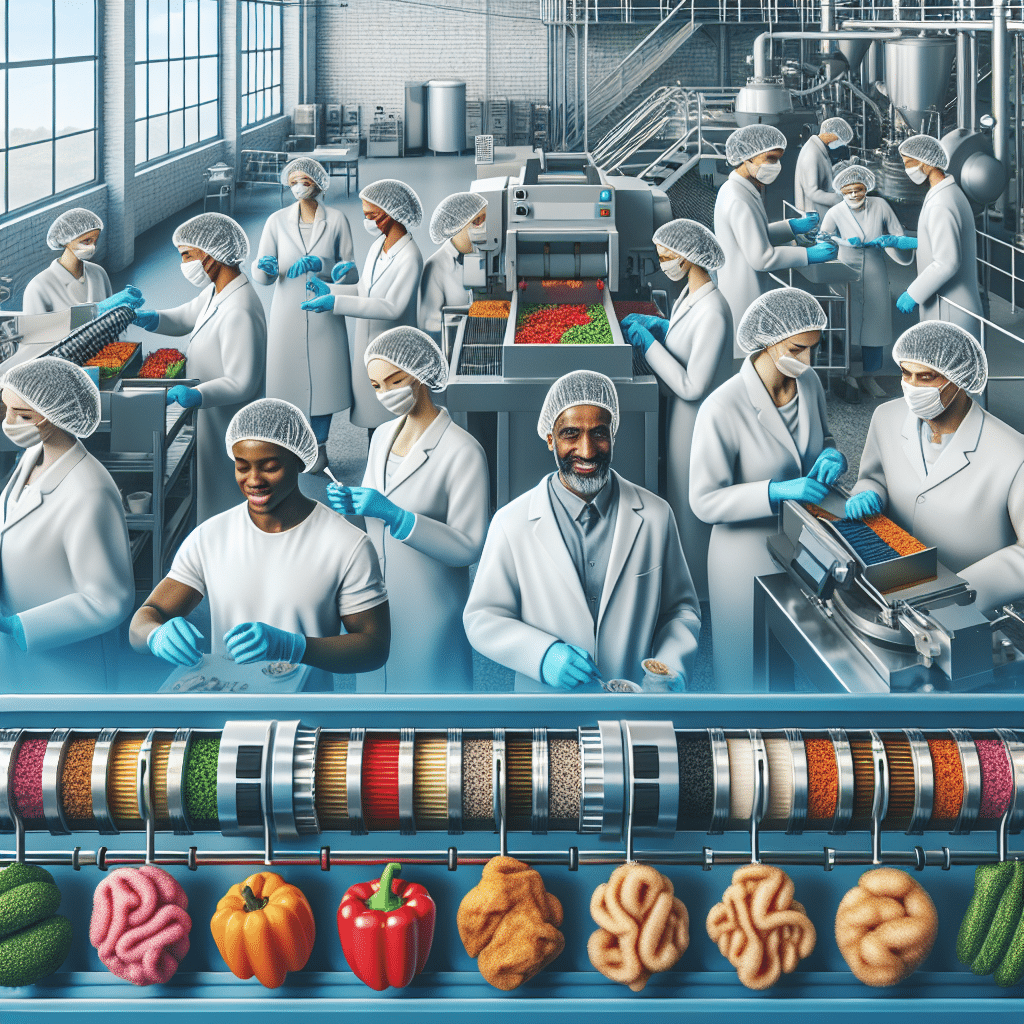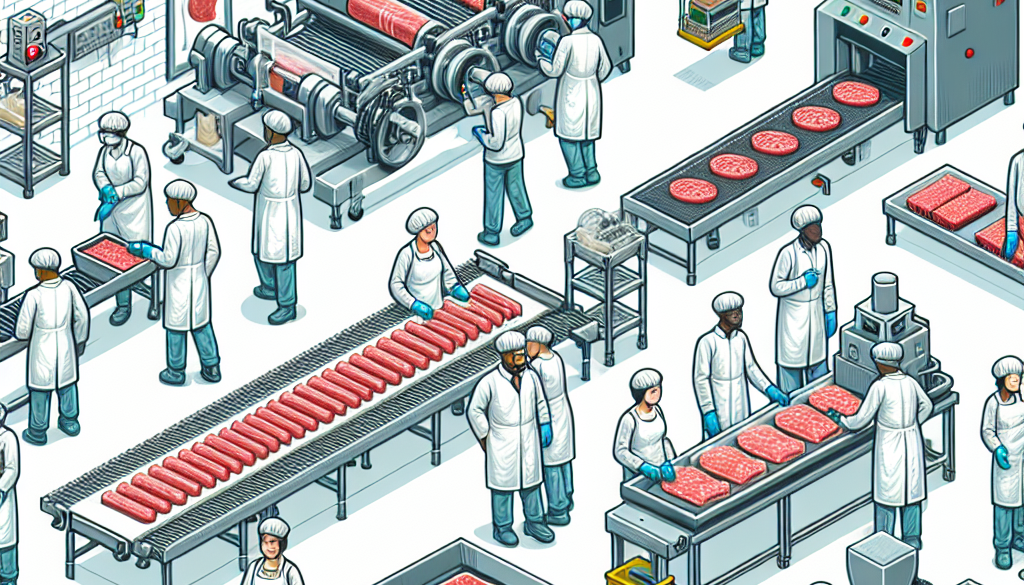Plant – Based Meat Alternatives: Manufacturing Food Safety Considerations
-
Table of Contents
- Plant-Based Meat Alternatives: Ensuring Food Safety in Manufacturing
- Understanding Plant-Based Meat Alternatives
- Food Safety Challenges in Manufacturing
- Key Manufacturing Food Safety Considerations
- Ingredient Sourcing and Traceability
- Facility Design and Equipment
- Hygiene and Sanitation Protocols
- Quality Control and Testing
- Regulatory Compliance
- Statistical Insights into Plant-Based Meat Safety
- Best Practices for Manufacturers
- Conclusion: The Importance of Food Safety in Plant-Based Meat Production
- Discover ETprotein’s High-Quality Plant Proteins
Plant-Based Meat Alternatives: Ensuring Food Safety in Manufacturing

The rise of plant-based meat alternatives has been meteoric in recent years, with consumers increasingly seeking out products that are not only better for the environment but also align with their ethical and health considerations. As the demand for these products grows, so does the need for stringent food safety measures in their manufacturing. This article delves into the critical considerations that manufacturers must address to ensure the safety and quality of plant-based meat alternatives.
Understanding Plant-Based Meat Alternatives
Plant-based meat alternatives are designed to mimic the taste, texture, and nutritional profile of animal meat, using ingredients derived from plants. Common sources of protein in these products include soy, peas, and other legumes, as well as grains like wheat and rice. The manufacturing process often involves extrusion, where plant proteins are subjected to high temperatures and pressures to achieve the desired meat-like consistency.
Food Safety Challenges in Manufacturing
The production of plant-based meats presents unique food safety challenges that must be carefully managed:
- Cross-Contamination: Facilities that process both plant-based and animal-based products must prevent cross-contamination.
- Allergen Management: Many plant proteins are common allergens, necessitating strict segregation and labeling practices.
- Microbial Risks: Plant-based ingredients can harbor pathogens, making microbial control a top priority.
- Process Control: The complexity of the manufacturing process requires precise control to ensure product consistency and safety.
Key Manufacturing Food Safety Considerations
Ensuring the safety of plant-based meat alternatives involves a multi-faceted approach:
Ingredient Sourcing and Traceability
Manufacturers must source high-quality ingredients from reputable suppliers. Traceability throughout the supply chain is crucial for quick response in the event of a food safety issue.
Facility Design and Equipment
Facilities should be designed to minimize the risk of contamination, with dedicated areas for handling allergens. Equipment must be suitable for thorough cleaning and sanitation.
Hygiene and Sanitation Protocols
Robust hygiene and sanitation protocols are essential to prevent microbial contamination. This includes regular cleaning schedules and employee hygiene training.
Quality Control and Testing
Rigorous quality control measures, including regular testing for contaminants and pathogens, are necessary to ensure product safety.
Regulatory Compliance
Manufacturers must comply with all relevant food safety regulations, which may vary by region. This includes labeling requirements for allergens and nutritional content.
Statistical Insights into Plant-Based Meat Safety
Recent studies have shown that plant-based meats can be just as susceptible to contamination as traditional meats. For instance, a 2020 study found that 25% of plant-based meat products tested contained traces of pathogens such as E. coli. This underscores the importance of stringent food safety protocols in the manufacturing process.
Best Practices for Manufacturers
To ensure the safety of plant-based meat alternatives, manufacturers should adopt the following best practices:
- Implementing a Hazard Analysis and Critical Control Points (HACCP) system.
- Training staff thoroughly in food safety and hygiene practices.
- Conducting regular audits and inspections to identify and address potential risks.
- Engaging in continuous improvement processes to enhance food safety measures.
Conclusion: The Importance of Food Safety in Plant-Based Meat Production
The manufacturing of plant-based meat alternatives comes with its own set of food safety challenges. Addressing these challenges is crucial for protecting consumer health and maintaining the credibility of the plant-based industry. By implementing rigorous food safety protocols and adhering to best practices, manufacturers can ensure that their products are not only delicious and sustainable but also safe for consumption.
Discover ETprotein’s High-Quality Plant Proteins
If you’re in the market for top-tier plant-based proteins, ETprotein offers an extensive range of products that meet the highest standards of quality and safety. Their organic, non-GMO, allergen-free proteins are perfect for manufacturers looking to create safe and delicious plant-based meat alternatives.
About ETprotein:
ETprotein, a reputable protein and L-(+)-Ergothioneine (EGT) Chinese factory manufacturer and supplier, is renowned for producing, stocking, exporting, and delivering the highest quality organic bulk vegan proteins and L-(+)-Ergothioneine. They include Organic rice protein, clear rice protein, pea protein, clear pea protein, watermelon seed protein, pumpkin seed protein, sunflower seed protein, mung bean protein, peanut protein, and L-(+)-Ergothioneine EGT Pharmaceutical grade, L-(+)-Ergothioneine EGT food grade, L-(+)-Ergothioneine EGT cosmetic grade, L-(+)-Ergothioneine EGT reference grade and L-(+)-Ergothioneine EGT standard. Their offerings, characterized by a neutral taste, non-GMO, allergen-free attributes, with L-(+)-Ergothioneine purity over 98%, 99%, cater to a diverse range of industries. They serve nutraceutical, pharmaceutical, cosmeceutical, veterinary, as well as food and beverage finished product distributors, traders, and manufacturers across Europe, USA, Canada, Australia, Thailand, Japan, Korea, Brazil, and Chile, among others.
ETprotein specialization includes exporting and delivering tailor-made protein powder and finished nutritional supplements. Their extensive product range covers sectors like Food and Beverage, Sports Nutrition, Weight Management, Dietary Supplements, Health and Wellness Products, and Infant Formula, ensuring comprehensive solutions to meet all your protein needs.
As a trusted company by leading global food and beverage brands and Fortune 500 companies, ETprotein reinforces China’s reputation in the global arena. For more information or to sample their products, please contact them and email sales(at)ETprotein.com today.














